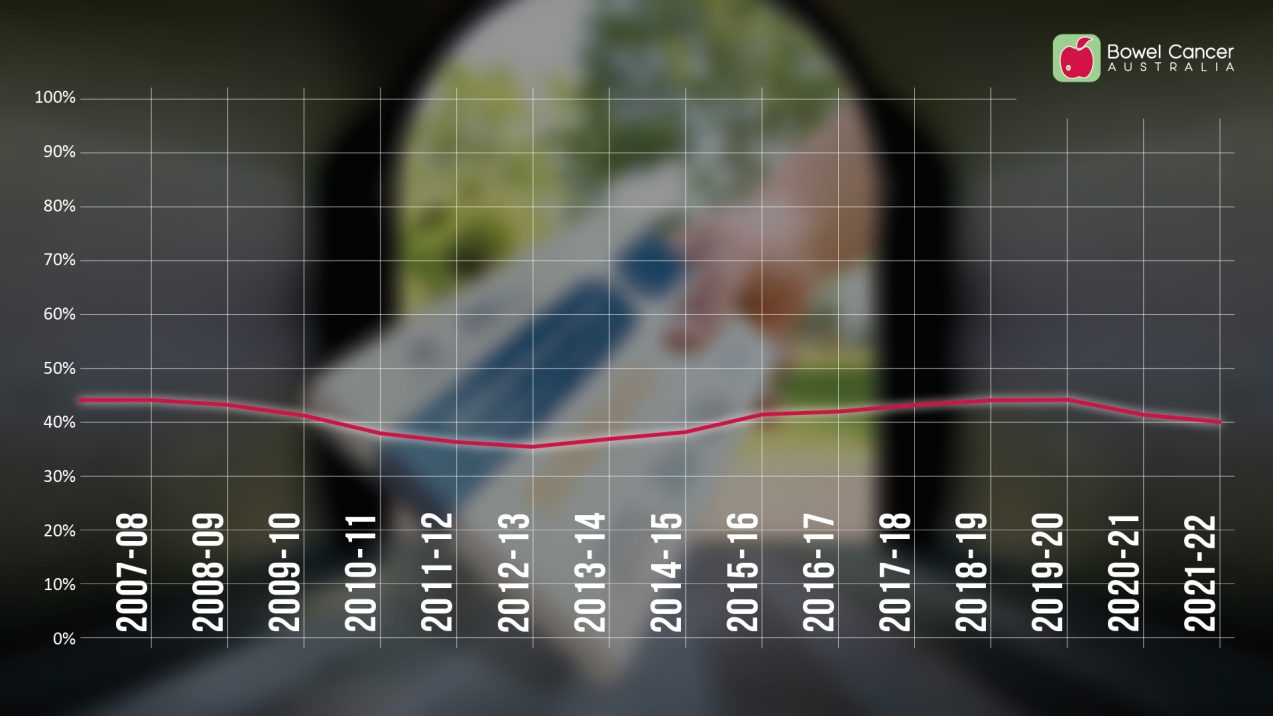A new AIHW report reveals how the states and territories stack up when it comes to participation and waiting times for colonoscopies.
Just four in 10 Australians participate in Australia’s National Bowel Cancer Screening Program, a new report has revealed.
And in some parts of the country, that number falls as low as about three in 10 people. One in 25 people assessed via colonoscopy after a positive screen in 2022 were diagnosed with a confirmed or suspected cancer.
The latest Australian Institute of Health and Welfare’s National Bowel Cancer Screening Program (NBCSP) Monitoring Report reveals a small decline in participation – 40% in 2022 down from 40.9% in 2021.
The report comes on the eve of a new plan to lower the age of eligibility for inclusion in the program. From 1 July, eligible people aged 45-49 can opt in and request their first bowel cancer screening test be mailed to them. Further tests will then automatically be mailed to them every two years.
Bowel cancer is Australia’s second deadliest cancer, claiming over 5300 lives each year. More than 15,300 people are diagnosed with bowel cancer each year, and one in nine of them is under 50.
The AIHW report says six million Australians aged 50-74 were invited to participate in the Program in 2022, yet six in 10 did not return their free bowel cancer screening test, despite several multi-million-dollar advertising campaigns to increase participation.
“This is the second consecutive year of declining NBCSP participation rates since 2020, which is of concern, given the program’s life-saving potential as 99% of bowel cancer cases can be successfully treated when detected early,” said Bowel Cancer Australia CEO Julien Wiggins.

All states and territories saw a drop in participation except for the Northern Territory, where 27.4% of eligible people participated in 2022 (compared to 25.6% in 2021). South Australia had the highest participation rate in 2022 (44.1%, down from 44.4% in 2021), followed by the ACT (43.9%, down from 44%), Tasmania (43.8%, down from 44.4%), Victoria (42.6%, down from 43.9%), Western Australia (40.5%, down from 41.5%), NSW (38.7%, down from 39.5%), and Queensland (36.9%, down from 37.5%),
In 2022, 64,932 (5.7%) participants received a positive result from their test, meaning blood was detected in the sample and further investigation via colonoscopy was required.
However, only 13.5% of people reportedly received that colonoscopy within the recommended 30-day timeframe, down from 15.6% in 2021. The average wait time ranged from 133 days to 197 days, depending on the state (2021: 119-235 days).
“The opportunity for early detection is lost if a positive screening result is not promptly followed by a colonoscopy,” said Mr Wiggins.
Time between positive screen and diagnostic assessment via colonoscopy varied between the states and territories, with some improving in 2022 on 2021, however the numbers were still well short of the 30-day recommended timeframe between positive screen and colonoscopy.
However, some showed improvements on wait times in 2021, the AIHW report showed.
The wait was longest in Tasmania (197 days in 2022, compared to 235 in 2021), followed by the Northern Territory (175 days in 2022, 178 in 2021), NSW (160 days in 2022, 162 in 2021), South Australia (160 days in 2022, 154 in 2021), the ACT (159 days in 2022, 151 in 2021), Queensland (153 days in 2022, 141 in 2021), Victoria (150 days in 2022, 136 in 2021), and Western Australia (133 days in 2022, 119 in 2021).
It is estimated that in 2024 about 7265 people aged 50–74 will be diagnosed with bowel cancer (around 47% of all bowel cancers diagnosed) and 1793 people in this age group will die from the disease (around 34% of all bowel cancer deaths).
Since the program began in August 2006, about 11.4 million screening tests have been completed, with about 4.8 million people participating at least once.
Previous data linkage studies by the AIHW found that the NBCSP was contributing to reducing morbidity and mortality from bowel cancer in Australia.


